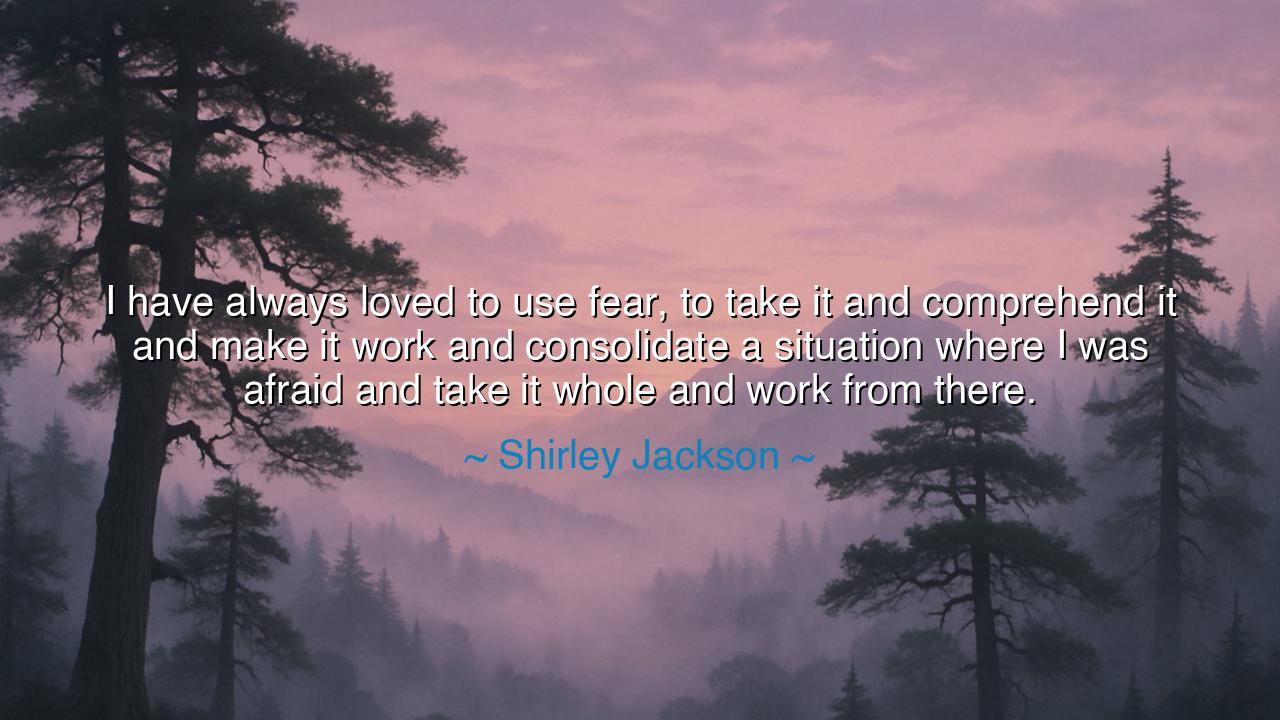
I have always loved to use fear, to take it and comprehend it
I have always loved to use fear, to take it and comprehend it and make it work and consolidate a situation where I was afraid and take it whole and work from there.






The great teller of shadows, Shirley Jackson, spoke of a truth that dwells deep within the human spirit: “I have always loved to use fear, to take it and comprehend it and make it work and consolidate a situation where I was afraid and take it whole and work from there.” These words are not merely about terror, but about power, understanding, and the alchemy of the soul. For fear is an ancient force, as old as the first beating heart, a primal flame that can consume or illuminate depending on the strength of the one who wields it.
To comprehend fear is to gaze unflinching into the abyss, to give a name to the darkness that threatens to overwhelm. Many flee from their trembling, but the wise gather it close, studying its shape and origin. Jackson speaks of making fear work, transforming it from a master into a servant. Like the blacksmith who tempers iron in fire, she tempers her spirit through terror, forging stories and truths from the heat of her own unease.
When she says she consolidates the situation, she speaks of mastery. Instead of allowing fear to scatter the mind into chaos, she gathers its fragments, creating form where there was none. In this way, the very moment of trembling becomes a foundation of strength. Thus, what was once a source of weakness becomes the cornerstone of creation, and what was once a burden becomes a weapon of insight.
Her life and her art are woven with this philosophy. In her tales, haunted houses and human cruelties become mirrors of the soul’s hidden anxieties. By taking fear whole, she does not deny or escape it, but embraces it entirely, transforming it into story, wisdom, and understanding. This is the path of the seer and the sage, who knows that the greatest demons are often born from within.
So let her words stand as a beacon to future generations: do not shun fear, for it is the raw material of growth. Take it into your hands, examine it, and from its trembling essence shape courage, art, and the power to master both yourself and the shadows that dwell in the world.






HTPho Hoang thi
Shirley Jackson's quote challenges the typical view of fear as something negative. What if, instead of seeing fear as something to conquer or escape from, we saw it as something to study and integrate into our lives? Could embracing fear in this way lead to greater courage and creativity? How would our lives change if we began to view our fears not as a barrier, but as a stepping stone?
VTLe van Truong
I admire how Shirley Jackson reframes fear as something to be comprehended rather than feared. It makes me think: how often do we allow fear to control us, instead of using it as a tool to enhance our strength? What would happen if we intentionally faced our fears, not with avoidance, but with the aim to understand and grow from them? Could this shift in mindset help us become more fearless in our daily lives?
TBT-Rabbit Boys
Shirley Jackson seems to suggest that fear, when understood and embraced, can be empowering. I wonder how many of us actually have the capacity to take something so uncomfortable and turn it into a positive force. Is this a learned skill, or do some people naturally have the ability to harness fear in such a way? Could facing our fears head-on make us more resilient in the long run?
MNMinhh Ngoc
I find Shirley Jackson’s perspective on fear intriguing. She doesn’t shy away from it but chooses to take it and use it to her advantage. Could this mindset be something we all could benefit from? What if, instead of fearing failure or discomfort, we used those feelings to propel ourselves forward? Could fear be redefined as a motivator rather than an obstacle?
NTNgoc Thi
Shirley Jackson’s approach to fear is fascinating. It’s almost as if she sees fear not as something to be avoided, but as a tool to work with and transform. How many of us can truly embrace fear like this, instead of running from it? Is it possible that the key to personal growth lies in confronting our fears head-on and learning from them? What do you think about the idea of fear as a source of strength?